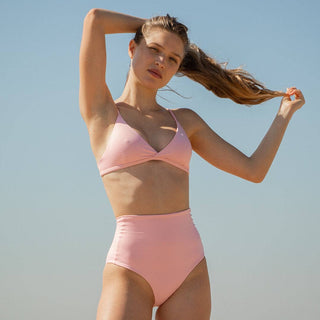In a world driven by trends that change faster than we can keep up, fashion has transformed. The term "fast fashion" is familiar to many, but what is it exactly, and why is it concerning? In this blog, we'll explore the negative impacts of fast fashion on the environment and workers. We'll then introduce you to "slow fashion," a concept that champions sustainability and ethical practices. Deciding to purchase from slow fashion brands is a major part of taking action in the solution of helping our world heal from the social and environmental impacts fast fashion has caused.
What is Fast Fashion?Fast fashion is the term used to describe a rapid and relentless cycle of clothing production and consumption to keep up with the trends. In the fast fashion industry, clothing is designed, produced, and distributed at breakneck speed. While this may sound efficient, it comes at a significant cost.
Negative Impact on the Environment:The fashion industry is notorious for its detrimental impact on the environment. Fast fashion wreaks havoc on our planet. The constant demand for new styles leads to increased production, which, in turn, results in a substantial environmental footprint. From excessive water consumption to the release of toxic chemicals, and the production of non-biodegradable waste, environmental problems plague the fast fashion industry. 100+ billion clothing items are produced every year. The disposal of unsold and outdated clothing contributes to overflowing landfills, further harming the environment - even though we're throwing away 90 million tons of textiles every year, 110 million tons of new fiber are produced.
Negative Impact on Workers:The dark underbelly of fast fashion often remains hidden. To meet the insatiable demand for low-cost clothing, workers in this industry often face harsh and exploitative conditions. From inadequate wages to unsafe workplaces, many laborers endure suffering to produce cheap garments for the global market. The human cost of fast fashion is a deeply troubling reality.
What is Slow Fashion?In stark contrast to fast fashion, slow fashion is a movement that prioritizes sustainability, ethical production, and mindful consumption. It is a concept that has emerged as a beacon of hope. Slow fashion brands place a strong emphasis on quality over quantity, longevity over trends, and the well-being of both people and the planet. It encourages us to reflect on our choices, and opt for sustainable and ethically produced clothing rather than adopt the "throw away" trend (and price point). In an era of fast fashion, we have become accustomed to buying cheap clothes that are often of poor quality and designed to be disposable. Slow fashion takes a different approach.
Benefits of Slow Fashion:
One of the key pillars of slow fashion is ethical production. Unlike fast fashion brands that often prioritize profit over worker welfare, slow fashion champions fair labor practices and transparency. Slow fashion brands prioritize sustainable materials, pay fair wages, and provide safe working conditions for their employees. By supporting slow fashion, we can contribute to a more equitable and just industry.
Sustainability: Slow fashion promotes sustainable practices such as using organic and recycled materials, reducing waste through recycling and upcycling, using natural fibers that require little to no manipulation with toxic chemicals. These brands focus on materials that are safe for people and the planet, and don't use the ones that are unsafe. Slow fashion brands adopt eco-friendly production practices to minimize their carbon footprint. This approach helps mitigate the harmful effects of the fashion industry on the environment.
Ethical Labor Practices: Slow fashion brands prioritize fair wages, safe working conditions, and respect for the rights and dignity of workers. By choosing slow fashion, you're supporting a more equitable and humane approach to production.
Quality and Longevity: Slow fashion encourages durable and timeless designs. These pieces are built to last, often handmade or made-to-order, reducing the need for frequent replacements and ultimately saving you money in the long run.
Unique Style: Slow fashion embraces individuality, offering pieces that are not always driven by trends but instead reflect a sense of personal style. By choosing slow fashion, you can express your uniqueness.
Be Part of the Solution: Choose Slow Fashion BrandsNow, more than ever, we have the power to make a difference. By consciously choosing to buy from slow fashion brands, you're taking a stand against the harmful impacts of fast fashion. You're promoting sustainability, supporting ethical labor practices, and embracing the timeless beauty of well-crafted garments.
You can be part of the solution. Your choices matter. Your wardrobe can become a statement of your values—values that prioritize the well-being of our world and its inhabitants. Slow fashion is not just a style; it's a movement, a conscious decision to contribute to a better, more sustainable future. So, with every piece you purchase, you're not just buying clothing; you're making a statement—a statement that says, "I choose a better world, one garment at a time and I look good doing it."







